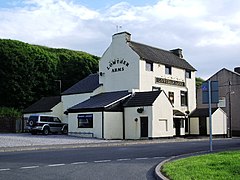Parton, Cumbria
| Parton | |
|---|---|
 Lowther Arms public house, Parton |
|
| Parton shown within Cumbria | |
| Population | 914 (2011) |
| OS grid reference | NX979205 |
| Civil parish |
|
| District | |
| Shire county | |
| Region | |
| Country | England |
| Sovereign state | United Kingdom |
| Post town | WHITEHAVEN |
| Postcode district | CA28 |
| Dialling code | 01946 |
| Police | Cumbria |
| Fire | Cumbria |
| Ambulance | North West |
| EU Parliament | North West England |
| UK Parliament | |
Parton is a village and civil parish on the Cumbrian coast, overlooking the Solway Firth, 1¼ miles (2 km) north of the town of Whitehaven. Formerly a port and a mining centre, it is now purely residential, benefiting from its location between the A595 trunk road and the Cumbrian Coast railway line.
The sheltered anchorage in Parton Bay was used by the Romans, who had a fort on the high ground to the north of the present village. Later, the bay was used by the inhabitants of Low Moresby, the hamlet which grew up to the east of the old fort in the Middle Ages. In Elizabethan times a number of small merchant vessels were based in the bay, trading as far as Chester; by this time there was probably also a salt-pan in operation. The port was developed in the early 17th century to cater for Moresby's coal trade, but fell into decline after two generations of the Lowther family turned the hamlet of Whitehaven into a major port. Although the Lowthers theoretically had the legal power to prevent port development at Parton, entrepreneur Thomas Lamplugh teamed up with Henry Fletcher, lord of the manor of Moresby, to "repair" the harbour at Parton, following which Fletcher sold off plots for development along the shore. Within about five years (boosted by Lamplugh's private Act of Parliament in 1705 to break the Lowthers' legal power) a new port community had developed, mainly serving local collieries, but also including industrial facilities such as a glassworks- which was able to export bottles as far as London thanks to the improved harbour.
Unfortunately, Parton Bay is not as well sheltered as Whitehaven, and within about 15 years, Lamplugh was unable to afford maintenance costs (possibly a contributory factor to the closure of the glassworks and salt-pan about this time). The manor of Moresby was bought in 1722 by one Thomas Brougham, who was able to sideline Lamplugh and develop the port himself, but ironically, in 1738, he sold his rights to the Lowther family. Surprisingly, rather than shut down the port which rivalled Whitehaven, they used it themselves for some of their coal shipments, and Parton prospered for decades. New industries developed, most notably a brewery, but everything was nearly wrecked in 1795, when a storm destroyed the harbour breakwaters. With such extensive damage, the harbour reverted to being a little fishing haven, but the village industries had enough local custom to survive, for a while at least.
...
Wikipedia

